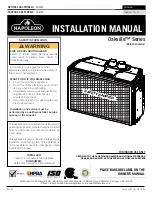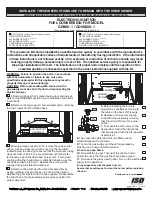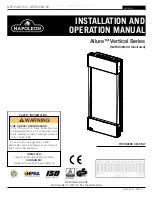
Chimney
The chimney is the driving force which makes the stove function. In order for the stove to
perform satisfactorily the chimney height must be sufficient to ensure the correct draught
of 14 to 18 Pa, so as to clear the products of combustion and prevent problems of smoke
leaking into the room when the stove is lit.
Note: A chimney height of not less than 4.5 metres, measured vertically from the outlet of
the stove to the top of the chimney, should be satisfactory.
Alternatively the calculation procedure given in BS 5854:1980 may be used as the basis
for deciding whether a particular chimney design will provide sufficient draught.
Please Note, this appliance has been tested by the manufacturers and works on a 3m
straight flue.
The outlet from the chimney should be above the roof of the building in accordance with
the provisions of the Building Regulations Approved Document J.
If the installation is into an existing chimney, then it must be sound and have no cracks or
other faults which may allow fumes into the house. Older properties, especially, may have
chimney faults or the cross section may be too large i.e. more than 230 x 230mm.
Remedial action should be taken if required, expert advice should be sought where
required.
If the chimney requires lining, then a suitable solid fuel flue liner must be used, in
accordance with Building Regulations Approved Document J.
Any existing chimney must be clear of obstruction and should have been swept clean
immediately before the installation of the stove. If the stove is fitted in place of an open
fire, then the chimney should be swept one month after installation to clear any soot falls
which may have occurred due to the difference in combustion between the stove and the
open fire.
If there is no existing chimney then either a prefabricated block chimney, in accordance
with Building Regulations Approved Document J or a twin wall insulated stainless steel
flue to BS 4543 can be used. These chimneys must be fitted in accordance with the
manufacturer’s instructions and the Building Regulations.
A single wall metal fluepipe is suitable for connecting the stove to the chimney but is
not suitable for using for the complete chimney. The chimney and
connecting fluepipe must have a minimum diameter of 150mm and it’s
dimension should be not less than the size of the outlet socket of the stove which is
150mm. Any bend in the chimney or connecting fluepipe should not exceed 45°. 90°
bends should not be used.
Combustible material should not be located where the heat dissipating through the
walls of fireplaces or flues could ignite it. Therefore when installing the stove in the
presence of combustible materials due account must be taken of the guidance on the
separation of combustible material given in Building Regulations Approved Document
J and also in these stove instructions.









































